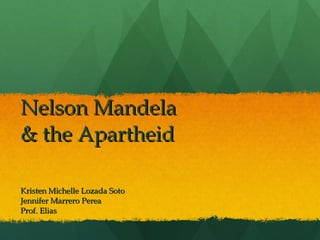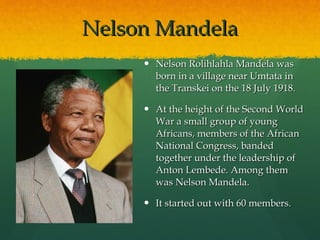Ppt Nelson Mandela
- 1. Nelson Mandela & the Apartheid Kristen Michelle Lozada Soto Jennifer Marrero Perea Prof. Elias
- 2. Nelson Mandela Nelson Rolihlahla Mandela was born in a village near Umtata in the Transkei on the 18 July 1918. At the height of the Second World War a small group of young Africans, members of the African National Congress, banded together under the leadership of Anton Lembede. Among them was Nelson Mandela. It started out with 60 members.
- 3. Nelson Mandela In opposition to the old guard', Lembede and his colleagues espoused a radical African Nationalism grounded in the principle of national self-determination. In September 1944 they came together to found the Africa National Congress Youth League (ANCYL).
- 4. Nelson Mandela After the banning of the ANC in 1960, Nelson Mandela argued for the setting up of a military wing within the ANC. In 1963, when many fellow leaders of the ANC and the Umkhonto we Sizwe were arrested, Mandela was brought to stand trial with them for plotting to overthrow the government by violence. His statement from the dock received considerable international publicity. On June 12, 1964, eight of the accused, including Mandela, were sentenced to life imprisonment.
- 5. Nelson Mandela During his years in prison, Nelson Mandela's reputation grew steadily. He was widely accepted as the most significant black leader in South Africa and became a potent symbol of resistance as the anti-apartheid movement gathered strength. He consistently refused to compromise his political position to obtain his freedom. Nelson Mandela was released on February 11, 1990.
- 6. Nelson Mandela In 1991, at the first national conference of the ANC held inside South Africa after the organization had been banned in 1960. Mandela was elected President of the ANC while his lifelong friend and colleague, Oliver Tambo, became the organization's National Chairperson.
- 7. Nobel Peace Prize He won the Nobel peace prize in 1993. He shared it with Mr. Frederik Willem Klerk. “ For their work for the peaceful termination of the apartheid regime, and for laying the foundations for a new democratic South Africa"
- 8. Nelson Mandela’s Quotes “ A good head and a good heart are always a formidable combination.” “ For to be free is not merely to cast off one's chains, but to live in a way that respects and enhances the freedom of others.” “ I learned that courage was not the absence of fear, but the triumph over it. The brave man is not he who does not feel afraid, but he who conquers that fear.”
- 9. Apartheid The Apartheid in South Africa was a system of racial segregation. This system was enforced by the National Party between 1948 and 1994. After the elections of 1994, reforms were made to it, but still parts of the apartheid shape the south African society and politics.
- 10. Anti-Apartheid Movement The anti-apartheid movement was the first successful transnational social movement in the era of globalization. The movement began after a massive turnout by rural Afrikaners gave Rev. Daniel Malan’s Nationalist Party a majority of five seats in the whites-only Parliament of the Union of South Africa on May 26, 1948. The Nationalists won on a racist platform that played on white fears of the “black threat” and promised to establish strict “apartheid” or separate development policies to counter it.
- 11. Anti-Apartheid Movement There were two main aspects of the anti-apartheid movement: the internal campaign and the external. At the heart of the movement was the struggle of black Africans to end white supremacy in South Africa. This internal movement was both a catalyst for actions at the international level and the critical link that gave coherence to the movement as a whole. The external effort can be divided into two fronts: (1) regional efforts to provide military bases, material, and diplomatic support for liberation movements; and (2) the diaspora movement, which focused on seeking international sanctions against the regime and providing direct aid to the liberation movements.
- 12. Anti-Apartheid
- 13. The End “ There is no passion to be found playing small - in settling for a life that is less than the one you are capable of living.”












